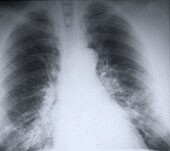- 10 Strategies to Overcome Insomnia
- Could Artificial Sweeteners Be Aging the Brain Faster?
- Techniques for Soothing Your Nervous System
- Does the Water in Your House Smell Funny? Here’s Why
- Can a Daily Dose of Apple Cider Vinegar Actually Aid Weight Loss?
- 6 Health Beverages That Can Actually Spike Your Blood Sugar
- Treatment Options for Social Anxiety Disorder
- Understanding the Connection Between Anxiety and Depression
- How Daily Prunes Can Influence Cholesterol and Inflammation
- When to Take B12 for Better Absorption and Energy
NYC Legionnaires’ Disease Outbreak May Be Slowing


FRIDAY, Aug. 7, 2015 (HealthDay News) — The ongoing outbreak of Legionnaires’ disease in New York City is showing signs of slowing, city health chief Dr. Mary Bassett said Friday.
In a statement, the head of the city’s Department of Health and Mental Hygiene said that there have been no new deaths, and no new reported cases over the past 24 hours.
Ten people have died, and 100 more are known to be infected with Legionnaires’ disease, in an outbreak that has been traced to water-filled cooling towers in the South Bronx.
However, “we now see the frequency of diagnoses decreasing, as well as the number of emergency department visits for pneumonia in the South Bronx,” Bassett said.
“We have fewer new cases, people are seeking care promptly and getting treatment promptly,” she added. “We’re optimistic that we’ve seen the worst of this outbreak, and that our remediation efforts are having an impact.”
Health experts note that the elderly, smokers and those with respiratory conditions are most vulnerable to the potentially deadly bacteria. New York City health officials said that of those who died, all were older individuals with other medical conditions.
And it’s possible new cases will crop up still.
“There are probably going to be more cases because the disease has a long incubation period — 10 to 14 days,” said Dr. Robert Glatter, an attending physician in the department of emergency medicine at Lenox Hill Hospital in New York City.
Another expert explained that the disease is more likely to get a foothold during warm weather.
“Every summer, when we are using air conditioning, the odds of an outbreak of Legionnaires’ disease increases,” said Dr. Debra Spicehandler, an infectious diseases specialist at Northern Westchester Hospital in Mount Kisco, N.Y.
Hospitals routinely test their water for Legionnaires’, she said. However, hotels, apartment buildings and offices are not required to test for it.
Glatter said that most of the people who are affected by Legionnaires’ are the elderly, people who smoke and those with chronic medical conditions, such as emphysema or asthma. Children and young adults are usually not affected, he said.
According to Glatter, the bacteria is commonly found in water and soil. “However, when it is able to set up shop in cooling towers where the water is warm, it can reproduce quickly and spread,” he said.
But Spicehandler noted that “it’s a very simple, treatable disease most of the time.”
Among the young and healthy, the infection runs its course without treatment, but among those at high risk, up to 30 percent can die, Glatter said.
Fortunately, Legionnaires’ cannot be spread person-to-person, Glatter said. “It is airborne and is contracted by inhaling it or, in theory, through drinking water,” he said.
Legionnaires’ causes fever, cough and chills, Glatter said. If caught early, it can be treated with antibiotics.
“Death is usually caused by respiratory failure,” Glatter said. “The bacteria overwhelms the lung tissue and reduces the ability to get oxygen into the lungs. Asphyxia [suffocation] is the main cause of death,” he said. “Death can occur within three to five days or sooner.”
Legionnaires’ disease was first seen among 2,000 American Legionnaires attending a convention in Philadelphia in the summer of 1976, according to the U.S. Centers for Disease Control and Prevention. The outbreak was linked to air conditioner cooling towers in the Bellevue-Stratford Hotel. That outbreak sickened 221 people, and 34 died.
“People should not be alarmed at this point,” Glatter said. “The cooling towers are being cleaned and disinfected, and these measures should make the public feel safer,” he said.
More information
Visit the U.S. Centers for Disease Control and Prevention for more on Legionnaires’ disease.
Source: HealthDay
Copyright © 2026 HealthDay. All rights reserved.










